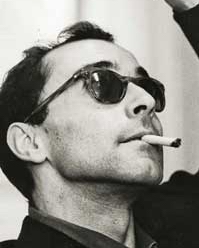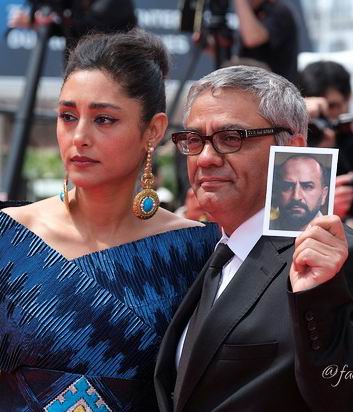|
|
| Welcome to Online Film Home! |
|---|
|
|
|

Godard, Jean-Luc |
Date of birth
3 December 1930, Paris, France
Date of death
13 September 2022, Rolle, Vaud, Switzerland
Jean-Luc Godard (December 3, 1930 - September 13, 2022)
Jean-Luc Godard was one of the most influential members of the nouvelle vague. Born in Paris to Franco-Swiss parents, he was educated in Lyon and at the Lycée Rohmer and the Sorbonne in Paris.
While at the Sorbonne he became involved in a Paris film club and became attached to a group including François Truffaut, Jacques Rivette, and Eric Rohmer.
When André Bazin founded his critical magazine Cahiers du cinéma in 1951, Godard with Rivette and Rohmer were among the first writers.
“A story should have a beginning, a middle, and an end... but not necessarily in that order. ”
Early films
Like many writers for Cahiers du cinéma, Godard started making some brief forays into film direction. His first film was a documentary, Opération béton (1954).
In 1958, he shot Charlotte et son Jules (released in 1960) and Une histoire d'eau (released in 1961), the first was a homage to Jean Cocteau the second to Mack Sennett.
He continued his critical writing however and became one of the key proponents of the nouvelle vague or New Wave.
His first major work was À bout de souffle (1960), starring Jean-Paul Belmondo and Jean Seberg. It was a success both critically and with audiences in France and internationally, and became a key film of the New Wave styles — American cinema influences, harsh editing, and a real pleasure in film-making.
His next success was Vivre sa vie (1962). The following year he made the marvellous failure Les Carabiniers, a homage to Vigo.
In 1964, Godard and his wife Anna Karina (married in 1961) formed a production company, Anouchka Films. In 1965, Godard directed Alphaville, une étrange aventure de Lemmy Caution and Pierrot le Fou. At the end of that year he and Anna Karina divorced.
Godard and politics
Politics have never been far from the surface in Godard's films. One of his earliest features, Le Petit Soldat, dealt with the Algerian war of independence, and was notable for its attempt to present the complexity of the dispute rather than pursue any specific ideological agenda.
Godard's early career is characterised by the interspersing of such films with 'lighter' romantic films such as Une Femme est une Femmme; however, as the sixties progressed he began to merge the two genres — romantic and political — to produce films like Alphaville and Pierrot le Fou, masterpieces of alienation.
Towards the end of the decade he began to move ever-closer to overtly political statements in his films, shooting Masculin, féminin (1966) and Made in U.S.A (1966), amongst others. In 1967, he directed La Chinoise, marrying its star Anne Wiazemsky during filming.
Amid the upheavals of the late 1960s Godard became interested in Maoist ideology. He formed the socialist-idealist Dziga-Vertov cinema group and produced a number of shorts outlining his politics.
In that period he travelled extensively and shot a number of films, most of which remained unfinished or were refused showings, but the dazzling anti-consumerist Week End was released in 1967. His films became intensely politicized and experimental, a phase that lasted until 1980.
Later films
His return to somewhat more traditional fiction was marked with Sauve qui peut (1980), the first of a series of more mainstream films marked by autobiographical currents: for example Passion (1982), Lettre à Freddy Buache (1982), Prénom Carmen (1984) and Grandeur et décadence (1986).
There was, though, another flurry of controversy with Marie, Je vous salue (1985), which was banned by the Catholic Church for alleged heresy, and also with King Lear (1987), an extraordinary but much-excoriated essay on Shakespeare and language.
His later films have been marked by great formal beauty and frequently a sense of requiem — films such as Nouvelle Vague (1990), the autobiographical JLG/JLG - autoportrait de décembre (1995), and For Ever Mozart (1996).
During the 1990s he also produced perhaps the most important work of his career in the multi-part series Histoires du Cinema, which combined all the innovations of his video work with a passionate engagement in the issues of twentieth-century history and the history of film itself.
Selected filmography of
Godard, Jean-Luc
2018
The Image Book | Le livre d'image (2018)
2014
Goodbye to Language | Adieu au langage (2014)
2011
Film Socialism (2010)
2001
In Praise of Love | Éloge de l'amour (2001)
1982
PASSION (1982)
1980
Every Man for Himself | Sauve qui peut (la vie) (1980)
1976
Here and Elsewhere | Ici et Ailleurs (1976, Avant-Garde)
1972
Tout va bien | Just Great (1972)
1970
Wind from the East | Le vent d'est (1970)
1967
La Chinoise, ou plutôt à la Chinoise: un film en train de se faire (1967)
1966
Masculin féminin: 15 faits précis (1966)
1965
Pierrot le fou is (1965)
1965
Alphaville (1965)
1964
Band of Outsiders | Bande à part (1964)
1963
Contempt | Le Mépris (1963)
1962
Vivre sa vie (1962)
1960
Breathless | Bout de souffle (1960)
|
|
|
|

Cannes 2024 |
Choose an item to go there!
|
| |
|
|

